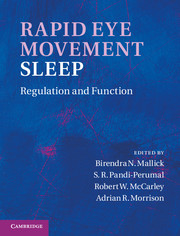Book contents
- Frontmatter
- Contents
- Contributors
- Preface
- Acknowledgments
- Organization
- Section I Historical context
- Section II General biology
- Section III Neuronal regulation
- Section IV Neuroanatomy and neurochemistry
- Section V Functional significance
- 30 Significance of deprivation studies
- 31 Modulation of body core temperature in NREM sleep and REM sleep
- 32 Sleep-related hippocampal activation: implications for spatial memory consolidation
- 33 The role of REM sleep in memory consolidation, enhancement, and integration
- 34 The role of REM sleep in emotional brain processing
- 35 REM-sleep loss, oxidative damage, and apoptosis
- 36 The role of REM sleep in maintaining neuronal excitability and its possible mechanism of action
- 37 Comparison of REM sleep-deprivation methods: role of stress and validity of use
- 38 REM sleep in patients with depression
- 39 Proteins and neuropeptides in REM-sleep regulation and function
- Section VI Disturbance in the REM sleep-generating mechanism
- Index
- Plate section
- References
37 - Comparison of REM sleep-deprivation methods: role of stress and validity of use
from Section V - Functional significance
Published online by Cambridge University Press: 07 September 2011
- Frontmatter
- Contents
- Contributors
- Preface
- Acknowledgments
- Organization
- Section I Historical context
- Section II General biology
- Section III Neuronal regulation
- Section IV Neuroanatomy and neurochemistry
- Section V Functional significance
- 30 Significance of deprivation studies
- 31 Modulation of body core temperature in NREM sleep and REM sleep
- 32 Sleep-related hippocampal activation: implications for spatial memory consolidation
- 33 The role of REM sleep in memory consolidation, enhancement, and integration
- 34 The role of REM sleep in emotional brain processing
- 35 REM-sleep loss, oxidative damage, and apoptosis
- 36 The role of REM sleep in maintaining neuronal excitability and its possible mechanism of action
- 37 Comparison of REM sleep-deprivation methods: role of stress and validity of use
- 38 REM sleep in patients with depression
- 39 Proteins and neuropeptides in REM-sleep regulation and function
- Section VI Disturbance in the REM sleep-generating mechanism
- Index
- Plate section
- References
Summary
Summary
Sleep-deprivation protocols are useful to examine the consequences of inadequate or insufficient sleep on health. By employing different paradigms of sleep deprivation or sleep restriction in humans and animals, numerous laboratories have come to the conclusion that insufficient sleep is stressful. Particularly, activation of stress response systems – the locus coeruleus/ adrenal medulla and the hypothalamic–pituitary–adrenal (HPA) axis – appears to be a caveat of instrumental methods to induce REM-sleep deprivation. However, not all effects of REM-sleep deprivation are mediated by increased secretion of glucocorticoids (the final outcome of HPA axis activation) nor are these effects common to other protracted stressors. Therefore, the present chapter presents an overview of the very peculiar form of stress represented by inadequate or insufficient sleep, by means of REM-sleep deprivation.
- Type
- Chapter
- Information
- Rapid Eye Movement SleepRegulation and Function, pp. 368 - 382Publisher: Cambridge University PressPrint publication year: 2011
References
- 2
- Cited by

